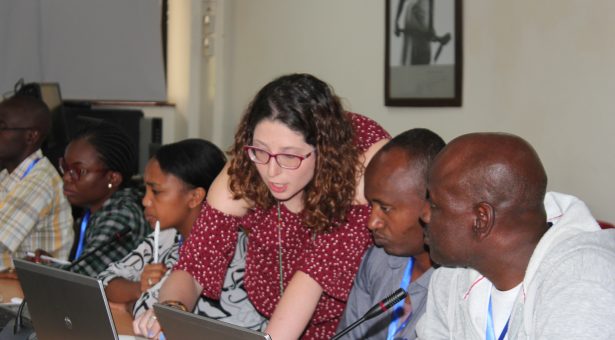Biosciences eastern and central Africa offers Pilar chance to shine

Biosciences eastern and central Africa offers Pilar chance to shine
Pilar Corredor Moreno is a second year DTP student who undertook her PIPS with the Biosciences eastern and central Africa-International Livestock Research Institute (BecA-ILRI) Hub in Kenya. Through the African Biosciences Challenge Fund (ABCF) Program, the BecA-ILRI Hub provides access to world class laboratories for African scientists conducting research on African agricultural challenges, including a wide variety of crops and livestock species.
Pilar was mainly involved in capacity building giving technical support to African scientists hosted at the BecA-ILRI Hub. One of Pilar’s roles was to organise a weekly training course on transcriptome data analysis for some of the fellows, using the HPC facilities on site, as well as running 1-to-1 and group support to fellows working on Genotyping by Sequencing GBS data. Pilar helped fellows identify the most adequate tools to perform Genome Wide Association Studies and population genetics as well as assisting with R programming and advising in a project to further characterise Theileria parva infection (causal agent of East Coast Fever) using transcriptomics.
Pilar was a key player in coordinating a workshop on ‘Advancing cereals genetic research using latest genomic and germplasm resources’ as an output of the BecA-JIC Partnership. The four day workshop was attended by 20 participants from five different countries. Pilar also delivered a session on assessing natural variation in cereal genomes and a practical session on using Biomart to query genome features. Pilar also participated in two other workshops, one of which was a BBSRC workshop on the ‘sustainable intensification of agricultural systems in sub-Saharan Africa’. The workshop brought together UK and African scientists to define potential future funding opportunities from the UK’s Global Challenges Research Fund. The second workshop brought together the main players of the John Innes Centre (JIC) and the BecA-ILRI hub partnership to measure impact and identify the future challenges for the collaboration to ‘accelerate crop and livestock improvement for food security in Africa’. Pilar found these workshops very interesting and she was able to interact through discussion with donors, funding agencies, scientists and farmers.
Pilar developed many skills during her internship and feels it has had a very positive impact on her development. “During my placement I got to interact with lots of people and find out more about the research challenges faced by scientists in Sub-Saharan Africa. For me it was an invaluable teaching and learning experience, and I feel more confident now about my own ability to teach and communicate my work”, reflects Pilar. Before taking her PIPs, Pilar was concerned about her bioinformatics knowledge not being enough to support the scientists at BecA and was anxious about her teaching abilities. However, the placement has greatly improved Pilar’s self-confidence as she has realised that she can make a difference by giving guidance to other people in their projects. Pilar was able to design and deliver a training course in a short period of time and got very good feedback on this, illustrating her excellent communication and presentation skills. Organising the training modules has improved Pilar’s understanding of the topic and delivering these has dramatically improved her teaching skills. “I have also improved my problem-solving skills. Before I would have avoided or procrastinated a task I was not comfortable doing. Now, I’m willing to accept challenges and try to find a solution to a problem”, says Pilar. “By being involved in many projects at the same time, I had to improve my time-management skills and my effectiveness. I had to develop strategies to deal with pressure, define priorities and organise my week beforehand. I had to multi-task and deal with several people and projects at the same time”. Other areas of improvement were team working and networking as well as gaining knowledge about funding and grant applications.
In terms of the impact on Pilar’s career aspirations, the placement has definitely broadened her horizons; “On one hand, I am more certain than ever that I would love to pursue a career in teaching or science communication. On the other hand, I would like to keep working on international agriculture. I have seen the limitations and opportunities of African Science and I would love to continue collaborating with institutions in the continent to achieve food security”, says Pilar. The placement has also given Pilar lots of perspectives and ideas that she will apply during the rest of her PhD project. “I feel more motivated now to go back to my project and put some of the things I learnt in practise. By seeing a direct application of my work, I am more motivated to conduct my research”.
